September 11 Recall: A Memory Of The Day Terrorism First Took Flight
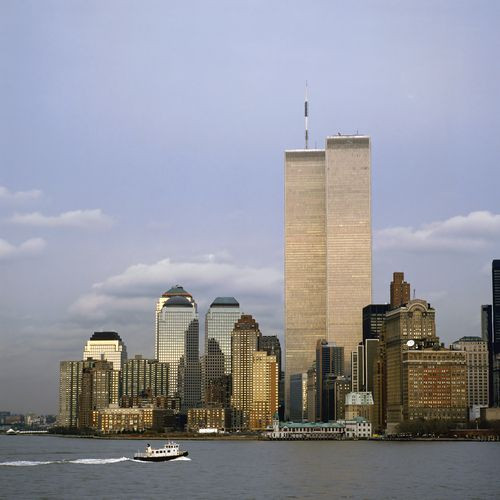
On that morning 13 years ago, I woke up to salsa music and lay half-asleep in my bed, until the announcer began to hablar Español, interrupting a song before it even finished. Not understanding him, I hit the off button and sat up in bed. I lived in a “charming” (small) apartment on Prince Street, then, between Mott and Elizabeth, and I worked on Water Street. Because it was such a beautiful, clear day, I could see one Disneyesque cloud floating high and white and far away in the narrow slice of sky visible from my window — I decided to walk to work as I often did, avoiding the drab subway. I chose Elizabeth Street, which wove through Chinatown and had an eccentric vibe in the morning light, with narrow dark-stoned buildings, bumpy, cracked sidewalks, and trees with anorexic builds and scoliosis spines.
After journeying only a few blocks, I saw a cluster of people standing and staring up at the sky. A few steps from them a middle-aged Chinese man stood staring in the same direction. I stopped and looked up. Frowning, I saw nothing but dark smoke — something on fire? I turned to walk away, but the man stopped me with a word:
“Plane.”
And then as a kind of instruction, he bent his head to the left and pointed at the sky. So I tried again, craning my neck in the same way he had, and this time I saw around an obstructing building and spotted what everyone else had been looking at: a jagged black maw cut into one of the Twin Towers from which dark smoke unfurled like a sinister flag. Oddly, this first sight of what I would later understand to be a historic act of war inspired no sense of danger, no sense of tragedy. Everything looked so small at the distance of a couple miles. The gleaming sun-dappled towers looked like simple, if massive, obelisks and not containers for humans, like ordinary buildings, and so I did not immediately think of the people inside the tower, though I did wonder about the airplane itself, which I assumed was some puddle-jumper, judging from the size of the hole at that distance.
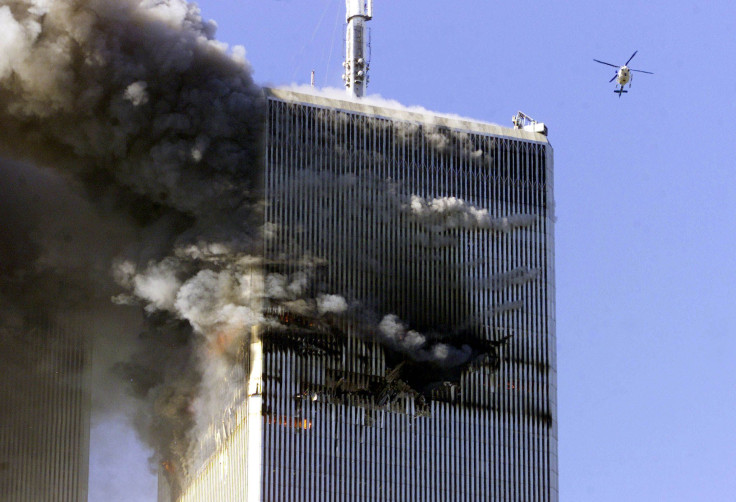
“How could a pilot have flown into the tower?” I asked.
The man nodded his head, his fixed smile and his alert eyes unchanging. I understood he had used up his small number of English words, so I smiled politely and continued on my way. Meanwhile, I figured it must have been a freak accident, engine failure, instruments not working, or something mechanical gone wrong. Because of the buildings blocking the view, it was only when I reached Canal Street that I could once again see the burning tower.
“Mira! A second one,” a man’s voice said.
I saw a twin gash, though lower down and closer to the waist of the second tower.
“No accidente,” the man added as I turned toward him.
The two holes looked so black, and all the dense smoke swirling out of each looked so foreboding, yet at this distance there was no sound. I watched as it all transpired in silence, the beauty of a perfect sky filling with ugly smoke, and slowly I became aware again of other people around me and the cars honking their horns in the street.
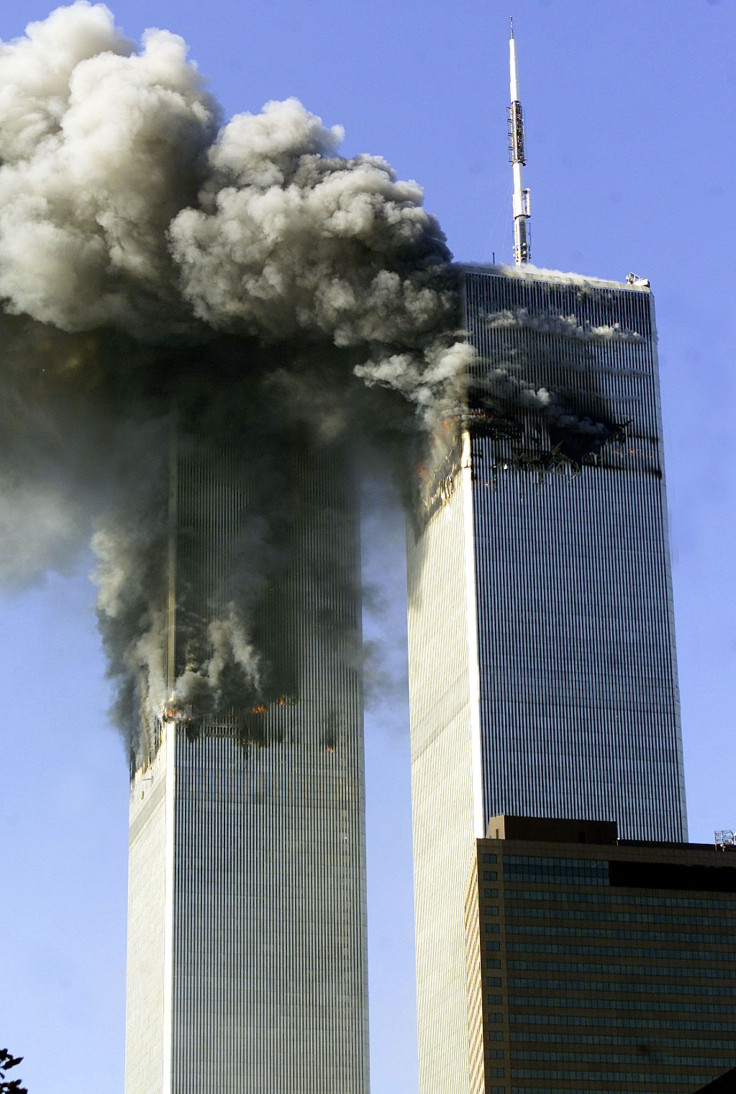
I turned and once again met the man’s eyes, which were of the darkest, most uniform brown. He grimaced wholeheartedly, as a baby does when tasting something bitter. Hurriedly, the man explained this could not be an accident while I said “si, si, si,” to assure him I understood perfectly, and as he rattled on I began to feel a cool shivery breeze of fear as my stomach tightened with dread. Side by side we stood and stared in silence, I could feel the man there beside me; we were shoulder-to-shoulder for some moments. We parted and I turned into Chatham Square where the panic, and that is what it had become, felt palpable.
Once again I stopped, this time at the street corner, but now it was not a voluntary pause along my way to work. I simply could not move forward. The anxiety and fear I felt coming from all around me prevented movement. So I observed a crowd of office workers hurrying as fast as they could, not in the direction of their jobs downtown or on Wall Street, but north. They were rushing north and east, as if trying to get as far away from the burning towers as possible.
Some appeared to be performing an awkward dance as they hurried forward while looking backward over their shoulders at the towers. In one of the cars passing in the street across the street from me, a plain clothes police officer lifted a portable blue flashing light to the roof of his unmarked car as he maneuvered past the stalled or motionless traffic headed away from the towers. His closed, hard New York cop face had opened — it was as if unseen hands had yanked the usual mask he wore from his head — revealing utter amazement and dim purpose in his eyes. On the sidewalk, a woman dressed in a chic dress paused to dial her cellphone as others in their haste bumped past her. Lifting the phone to her ear, her face crumpled like tissue paper, and her hand, still holding the useless object, dropped to her side.
Tension marked every passing face as people hurried to unknown destinations, young and old, the overweight and the thin, car attendants, accountants, store owners, and cafeteria workers, while the shrill note of a traffic cop’s whistle sounded again and again above the hubbub. I stood immobilized and unable to walk the rest of the way to work, which for some reason I still assumed I needed to get to, as the hysteria around me grew and matured and entered me as a virus might.
Within the crowd and chaos, my brain formulated a plan of action: Go home and call in sick. Having made this decision, I rediscovered my ability to move. Returning as I had come, Elizabeth Street was not crowded and I began to feel calmer until I passed a crowd of people lined up and patiently waiting outside the closed doors of a Chinese bank.
Do they line up like this every day or is this related to the planes? Sick with worry, I did not stop until I noticed the “open” sign on the door of the bakery, a place where I occasionally bought prosciutto rolls. A woman standing idle behind the counter looked up in surprise when I entered. Middle-aged with gray roots showing beneath a blonde dye job, she was listening to a radio, alarm visible on her face. Not knowing what to say, I stammered as I asked the price of bread.
The baker — an obvious relation with the woman’s same nose and chin — stepped out from the back and stood wiping his hands on his apron. “They’re saying terrorists,” he said to me.
“Terrorists?”
“They thought it was an accident at first but once the second plane hit… they’re saying terrorists.”
It all seemed inconceivable there and then: Two separate planes of terrorists? We talked a bit more, I thanked the baker and the woman, and then I walked the rest of my short distance home. Arriving at my building, one of the guys in the pizzeria across the street was standing on the sidewalk staring at the sky. “This is bad,” he called out to me, “This is really bad.” I entered the foyer of my building, my eyes adjusting to the change of light, and a woman, who seemingly came out of nowhere, asked, “Have you seen?”
Without waiting for an answer, the woman grabbed my arm and said, “Come on, let’s go to the roof!”
Along the way, we stopped in my apartment, but when I picked up my phone, as the woman predicted, my line was dead. We rushed upstairs to the roof. Other neighbors, only some I recognized, had already assembled there. A young guy I had often passed on the stairs said hello. Beside him, a 30-something woman took photographs with an elaborate camera and lens. As the neighbors traded, like bubblegum or baseball cards, what little information they’d been able to gather, each faced south and watched the billowing black smoke. The woman who had grabbed my arm claimed no one could make a phone call and her cell phone wasn’t getting a signal. “The circuits are jammed,” the woman with the camera said as she lined up another shot.
Another previously unknown neighbor opened the roof door and as he stepped onto the roof said, “The Pentagon’s been hit.”
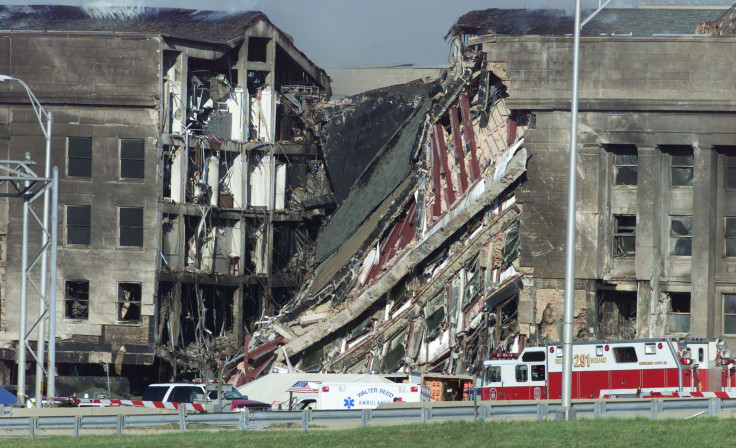
Hearing these words, some final wall crumbled inside me. If the Pentagon’s been hit, anything could happen, I reasoned. Planes could bomb the entire city and we will all die! And though I truly believed that just such a horror was about to happen, my life did not flash before my eyes as people say happens. I did not see my past unrolled like a carpet behind me. I turned to the neighbor who had brought the news of the Pentagon. “We’re going to die,” I said to him. I must have appeared absolutely out of my mind because his eyes turned grave. “Don’t worry,” he said. “There won’t be any more planes.”
I ran back downstairs and pointlessly tried the phone again. I couldn’t reach anyone in the city. Then I tried my parents’ house in New Jersey. Oddly, the call went through. and even more surprisingly. my father answered and it must have been one of his more lucent moments because he said that my mother had gone shopping and he was alone there. and when I told him what was happening and who knows but the whole city might collapse, he immediately said, “It can’t all go down that quickly.”
“But the Twin Towers — ”
“The city won’t fall so quickly.”
For whatever reason, this soothed me. “I love you, Dad.”
Gruffly, he said, “What’s the matter?” and two things occurred to me at once: that what I had said surprised him because we were not a family who said “I love you” routinely and that my father was not in his right mind, he had already traveled most of the distance to final stage Alzheimer’s disease.
Understanding both these things, I felt myself once again alone on an island and so I said goodbye and my father said, “Who…?” as if he couldn’t remember who had been talking to him or what had been said and we both hung up.
I ran back up the stairs to the roof and standing side by side with my neighbors, I watched first one tower collapse and then the other. Each sprayed shattered glass and sun-reflecting metal parts like sparks into the brilliant blue sky as they went down in a cloud of billowing smoke. Oddly, as if choreographed, all of us at the same time turned north and looked at the Empire State building, as if collectively we could will it to remain standing.

Later, after watching the news in a neighbor’s apartment — he had cable, so his TV still worked though most of us couldn’t get a signal with the towers gone — I decided to go and stock up on groceries as who knew what would happen next?
The entire neighborhood had swept through the nearby market, grabbing cans of tuna and bottled water off the shelves, or at least that’s how it appeared to me as I walked up and down the aisles with a shopping basket on my arm. From what remained on the shelves, I chose two jars of peanut butter, crackers, apples, and lime-flavored seltzer water. While I waited in line, the older man standing behind me asked if my water had been turned off, the plumbing in his building on Spring wasn’t working. Then a young woman in an AIDS/ActUp t-shirt entered the store and stood beside the cashier and announced in a voice loud enough to be heard that the hospital blood banks needed to be filled. “St. Vincent’s,” said a woman's voice behind me. “Beth Israel, too,” ActUp said.
After unloading my groceries at home, I began my trek to St. Vincent’s, and as I walked, I looked at the people I passed. Some seemed to be going about their business as if it were any other day, while others looked as lost as I felt. Arriving at the hospital, a middle-aged woman standing on the sidewalk outside the emergency entrance told me the blood banks had been filled, but buses were coming to take people uptown to the American Red Cross. The woman, who had the roving eye of someone eager for others to jump into her conversation, said, “Think of how much blood they will need! So many people work in those two buildings, it’s like a small town.” Then in a more confidential tone, she added, “I worked there years ago.” As she explained, a bus pulled up to the curb.
I found a place squeezed between an elderly woman, who clasped her hands as if in prayer, and a teenaged boy, who fixated on his Gameboy. Once uptown, we got off the bus only to be informed by a tall guy wearing a Red Cross t-shirt that the blood banks had been filled (again!), but everyone was welcome to fill out a volunteer form. In the auditorium where we’d all been herded, I filled out a form and then left the building. The afternoon was wearing on, the sun no longer overhead. Looking around, I noticed a man in a crisply ironed shirt and jeans I’d seen in the crowd outside St. Vincent’s. He asked if I knew anything about the buses. “The trains aren’t running. By order of the mayor,” he added, rolling his eyes. Stranded with no transportation, once again I began my four or five mile trek home, this time heading south.
New York was in disaster mode. It is always chatty and companionable whenever blizzards hit or some unexpected blackout occurs. I studied the people walking toward me and peered into passing doors. Clusters of people gathered on corners, shop owners stood inside their doors ready and waiting to spark a discussion. I stopped in a bodega for water and overheard a conversation about the number of the dead. “Thousands for sure,” said a squat woman with a prominent mole on her chin. I shivered despite the heat. When I reached Times Square, the streets were nearly empty and the stories-high TV screens, which normally looped videotaped ads ad nauseum, remained ominously blank. For a full minute I stood in the middle of the street and stared up, up, mesmerized by the sheer lack, the ominous void.
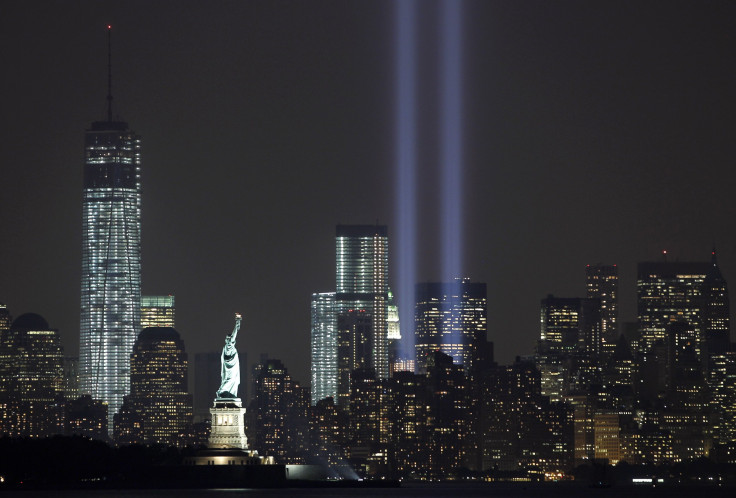
Published by Medicaldaily.com



























